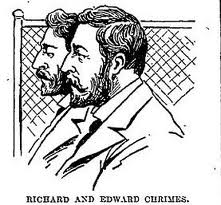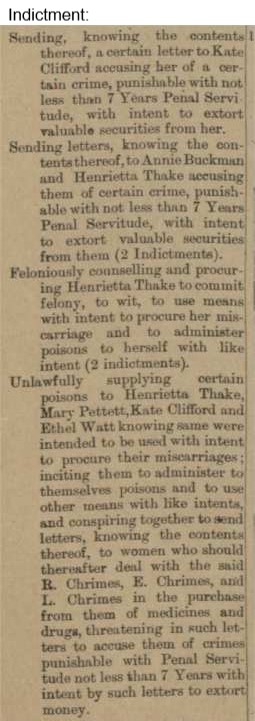
The story of the
Chrimes, Crimes, Chrymes and Crymes
surnames

The story of the
Chrimes, Crimes, Chrymes and Crymes
surnames
The infamous Chrimes brothers - blackmailers
In 1899 Richard, Edward and Leonard Chrimes stood trial at the Old Bailey, London accused of blackmailing thousands of vulnerable women who were seeking to abort their unborn children. By the law of the time, advertising for sale products claimed to bring about an abortion was not illegal, but aborting or attempting to abort a child was an offence punishable by a prison term. The Chrimes brothers sought to exploit this legal contradiction.
 Operating from a series of rented rooms in London in 1897, the brothers advertised medicines, for sale
by mail order, clearly promoted to bring about an abortion, without explicitly mentioning the word.
The orders arrived and the medicines (useless of course) were despatched. The purpose of this scam was to
obtain the names and addresses of the customers. The court case reveals that the brothers had names and
addresses of 12,000 women and employed a clerical company in the printing of 8,000 headed letters and
addressed envelopes, to which the brothers then applied the text of the blackmail letter, using a
"Cyclostyle", an early duplicating machine.
Operating from a series of rented rooms in London in 1897, the brothers advertised medicines, for sale
by mail order, clearly promoted to bring about an abortion, without explicitly mentioning the word.
The orders arrived and the medicines (useless of course) were despatched. The purpose of this scam was to
obtain the names and addresses of the customers. The court case reveals that the brothers had names and
addresses of 12,000 women and employed a clerical company in the printing of 8,000 headed letters and
addressed envelopes, to which the brothers then applied the text of the blackmail letter, using a
"Cyclostyle", an early duplicating machine.
 The blackmail letter begins:
The blackmail letter begins:
"Madame, I am in possession of letters of yours by which I can positively prove that you did commit or
attempt to commit the fearful crime of abortion by preventing or attempting to prevent yourself giving
birth to a child. Either of these constitutes a criminal act, punishable by penal servitude, and legal
proceedings have already been commenced against you, and your immediate arrest will be effected unless you
do send me on or before Tuesday morning next the sum of £2 2s"
Despite attempts to cover their tracks by employing an innocent clerk to collect their mail from the London offices and deliver it to them at a meeting place in Brighton, the blackmail was inevitably reported to the police and the brothers were arrested. Richard and Edward were sentenced to 12 years imprisonment each, and Leonard to seven years.
In the 1901 UK Census the three brothers appear as "convicts" at Parkhurst prison on the Isle of Wight.
Comments were raised during and after the trail about the legality of the advertisements and the morals of
the newspapers in accepting them. The court case was widely reported, and typical of the style of
introduction to the newspaper stories is this extract from The Advertiser, Adelaide, South Australia
which shows little or no sympathy for the victims:
"The blackmail case at present before the public has laid disagreeably bare certain grisly facts. If one
insignificant advertisement hinting at improper remedies could in a few weeks tempt no fewer than 12,000
women to seek means to avoid the obligations of maternity, what appalling numbers there must always be on
the look out to shirk motherhood by any manner of means. Thank goodness the culprits in this particular
instance have now been laid by the 'heels. They were settling down quite quietly to a life of respectability
on their ill-gotten gains when the police intervened. Two of them had started a grocer's shop in the country,
whilst the third was in treaty for a Cornish poultry farm."
Upon release from prison, Richard resumed his married life and became a hotel proprietor. Edward changed his name to Edward Belgrave and married Dora Blanche Taylor (20 years his junior) in 1931. No trace can be found of Leonard, suggesting that he also may have changed his name.
Reference: Trove newspaper archive
David Chrimes
Updated January 2017